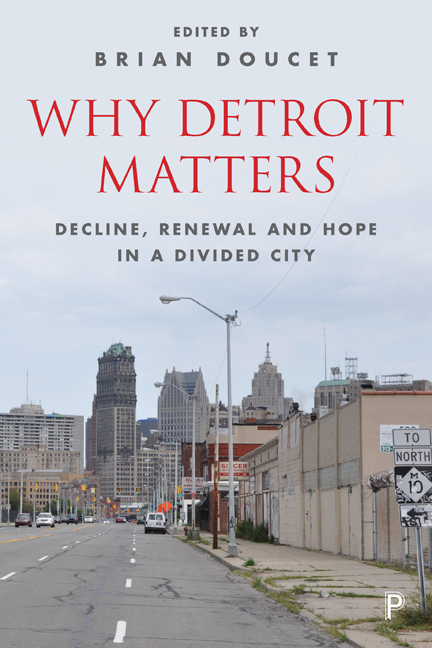Book contents
- Frontmatter
- Contents
- List of contributors
- List of figures and tables
- Acknowledgments
- one Introduction: why Detroit matters
- Section One Lessons from Detroit
- Intermezzo I You may not know my Detroit
- Section Two Practices from Detroit
- Intermezzo II My Detroit
- Section Three Conversations from Detroit
- References
- Index
nine - Evolution of municipal government in Detroit
Published online by Cambridge University Press: 05 April 2022
- Frontmatter
- Contents
- List of contributors
- List of figures and tables
- Acknowledgments
- one Introduction: why Detroit matters
- Section One Lessons from Detroit
- Intermezzo I You may not know my Detroit
- Section Two Practices from Detroit
- Intermezzo II My Detroit
- Section Three Conversations from Detroit
- References
- Index
Summary
The second section of the book focuses on new practices found in Detroit. It features chapters written by writers who are either engaged in these new activities, or by insightful commentators who have witnessed and written about the city for a long period of time. John Gallagher fits into this latter category; his close to 30 years of writing about economic and urban development for the Detroit Free Press puts him in a unique position to assess many of today's new social and spatial practices. The trend that he focuses on in this chapter is the spinning off of pieces of Detroit's government into public–private partnerships, non-profits, or other forms of governance outside the City of Detroit's direct control. Gallagher takes an optimistic, if cautious, assessment of the shift in places such as Eastern Market, Cobo Center, or Belle Isle away from city control. His arguments are rooted in the structural and historic decline of the city, as illustrated in earlier chapters by George Galster and Ren Farley. Gallagher describes how, amid rapid population and economic decline, the city became unable to provide the funding to support the institutions, parks, and amenities within its borders. While he acknowledges the improvements that such partnerships bring, he is also aware of the tensions, many of them racial in origin, which have been produced or exacerbated because of this.
Gallagher outlines several factors that contribute to the more successful operation of these places, including access to different sources of funding and dedicated management (points that are reiterated in the conversation with Dan Carmody, President of the Eastern Market Corporation, in Chapter Nineteen). However, as others have noted in this book (see Victor, Chapter Twenty), Gallagher also reminds us that we should not assume that these transformations represent the only story taking place in Detroit and that there is a growing gap between the city's economic and geographic core (where most of these spin-offs take place) and its periphery. There are many caveats we need to be cautious of, including the fact that many of these spin-offs took place while Detroit was under an emergency manager who was not democratically elected by the people.
- Type
- Chapter
- Information
- Why Detroit MattersDecline, Renewal and Hope in a Divided City, pp. 185 - 194Publisher: Bristol University PressPrint publication year: 2017



